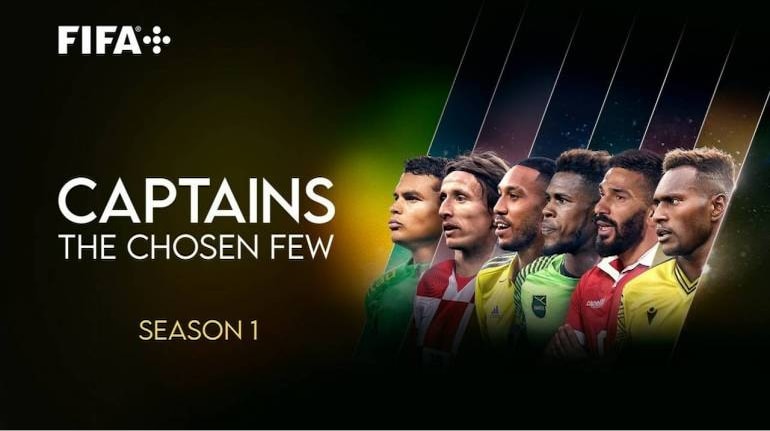



“You can’t find emotions like that at a club.”
Pierre-Emerick Aubameyang, the former Borussia Dortmund and Arsenal footballer, currently plying his trade for Chelsea in the English Premier League (PL), says this about playing for the country. The French-born forward chose to play for his native Gabon, a former French colony in central Africa with a population of under 2.5 million, in an attempt to qualify for this month’s Qatar FIFA World Cup.
Aubameyang could have easily attempted to be a part of the French team, which won the World Cup in Russia in 2018, but decides to go with the country that his family hails from and has little chance of qualifying.
He is one of six national team leaders who feature in a new documentary, Captains: The Chosen Few, an eight-episode mini-series that’s available for free on the FIFA website FIFA+ and Netflix. Joining Aubameyang in the series are Luka Modric of Croatia, Thiago Silva of Brazil, Andre Blake of Jamaica, Hassan Maatouk of Lebanon and Brian Kaltak of Vanuatu, a chain of islands on the Pacific with a population of just over three lakh.
The series follows their respective team’s journeys, told through the perspective of the captains, as they try to qualify for the World Cup over the course of the last two years. All teams are of different standards — Gabon is ranked 88 out of 211 teams recognised by FIFA, five-time World Cup champion Brazil is No.2, Croatia 17, Jamaica 59, Lebanon 92 and Vanuatu 163.
Some teams do qualify and some don’t, leading to ecstasy and heartbreak as many of the captains look for their final shot at the sport’s highest prize. Silva is 38, Modric, who led Croatia to the final in Russia in 2018, is 37, while Aubameyang is 33 and Maatouk 35. All of them believe 2022 is/was their last chance at the World Cup. Some, like Vanuatu, play more out of hope rather than with any realistic chance of qualifying for the 32-team mega event that will be played from 20 November to 18 December in Qatar.
Shot in their home countries and with access to qualifying match footage, the docu-series covers a lot of ground, but does not delve too deep into the personal lives of the captains. There are brief moments in which Modric’s children, Maatouk’s father and Silva’s mother make an appearance, but the focus remains on the teams, other players and the path to qualification.
Almost every episode ends in suspense — at a critical moment when a goal is about to be scored (or not) — which works as a hook for the next episode. Some moments are repeated, which adds to the overall watch time of the series in which each episode is 35-40 minutes long.
The film switches between matches, showing them simultaneously to maintain a uniformity in the different teams’ journeys. The drama builds gradually, unless you are aware of the final result, it helps maintain a gripping narrative.
There is also insight into some of the countries, teams and cultures which adds flavour to the story of the footballers. Silva talks about playing in Brazil’s varzea, underground communities that play unorganised, chaotic and physical football. “The pressure I feel today doesn’t even compare to what I felt there,” he says in Captains.
He talks about the high expectations from fans, who “only want the beautiful game” and “want me to be a superhero”.
Modric briefly goes silent, before opening up a bit about the war in Croatia in the early 1990s that disrupted his life. “Football was a way out,” he says.
Maatouk spent his early years in Germany, with his family, because of the unrest in Lebanon, especially Beirut. Kaltak is one of just three semi-professional players in the Vanuatu team. One of the Vanuatu players, a star from the under-20 World Cup in 2017 in India, who does not make the senior team due to injury, works as a gardener in Australia.
Aubameyang not only has to lift a team of mostly unheralded players, but also has the legacy of his father, Pierre Aubame, who was one of Gabon’s star players in the 1980s and '90s. Pierre senior has a role in the film, as the Gabon team’s general manager, a father figure to all and all-round role model. “Aubameyang is the embodiment of the nation,” says a Gabonese academic in the film, elaborating on what the country’s citizens hope from the player.
“All players who have lifted the trophy for Brazil have been defenders,” says Silva, stressing the kind of expectations he faces.
Besides the repetition of information, some jumps in cuts are jarring in Captains. Like a sudden montage of Modric creeps in, from the last World Cup in which Croatia lost the final to France 2-4. The music is single dimensional, used to build drama to every match that’s shown. Since a lot of the players do not speak in English, like Aubameyang, Silva, Maatouk and Modric, following the action while reading the subtitles can be challenging, particularly when the action on screen is hectic.
Captains does achieve the task of providing an easy introduction to some of the teams, like Brazil and Croatia, that will participate in Qatar. It helps in understanding the kind of stress professional footballers go through, from fans and from playing with each other. It’s an insight into modern-day sport, in which geographical boundaries matter differently. For example, Jamaica comprises many players of Jamaican origin from the UK, which causes some imbalance in the team morale.
Captains skims the surface when it could have dug in deep.
Discover the latest Business News, Sensex, and Nifty updates. Obtain Personal Finance insights, tax queries, and expert opinions on Moneycontrol or download the Moneycontrol App to stay updated!
Find the best of Al News in one place, specially curated for you every weekend.
Stay on top of the latest tech trends and biggest startup news.